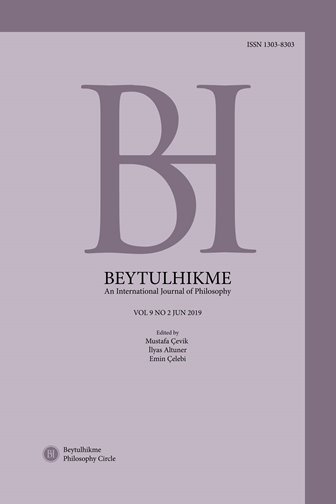Author :
Abstract
Osmanlı Devleti kuruluşundan itibaren bir geleneğe ve ahlak yapısına sahiptir. Özellikle İslam dininin ahlak yapısının ve İslam felsefesinin ortaya koyduğu ahlaki yapı üzerine inşa edilmiş bir geleneği vardır. Ancak Devletin son döneminde (Tanzimat’tan Cumhuriyet’e kadar) bilim ve tekniğin gelişmesi için çaba sarf edilirken Batının etkisi altında kalınmıştır. Öte yandan bu Batı etkisi yalnızca teknik, askeri anlamda değişimlere sebep olmamış, bir yandan da toplumsal yönlerin tümünde bir değişime sebep olmuştur. Çalışmamızda bu değişimin, askeri, teknik ve bilim alanındaki yenileşme faaliyetlerinin ahlaki alanı nasıl dönüştürdüğü, devletin fertlerinden umumi yapısına ve eğitim politikasına kadar ne tür değişimlere ve bozulmalara sebep olduğu üzerinde durulacaktır. Buradan hareketle bu bozulmanın yani ahlaki yozlaşmanın, değerlerin çöküşünün önüne geçilebilmesi için öneri olan ahlak ilminin ne olduğu, yeri ve önemi üzerine bir inceleme yapılmaya çalışılacaktır.
Keywords
Abstract
The Ottoman Empire has a tradition and moral structure since its foundation. In particular, it has a tradition built on the moral structure revealed by the moral structure of Islamic religion and Islamic philosophy. However, in the last period of the State, while the efforts were made to develop science and technique, it was under the influence of the West. On the other hand, this Western influence not only caused technical, military changes, but also a change in all social aspects. In our study, it will be emphasized that this change, military, technical and scientific renewal activities, transforms the moral field, causes changes and distortions from the members of the state to the general structure and education policy. From this point of view, an attempt will be made on what is the place, importance and importance of morality, which is a suggestion for preventing this corruption, moral corruption and the collapse of values.
Keywords
- Abdurrahman Şeref (2012). Ahlak İlmi. (Sad. M. Uyanık, A. Akyol). Ankara: Elis
- Akşit, M. (2018). İbn Rüşd'de Siyaset ve Ahlak İlişkisi. Iğdır Üniversitesi Sosyal Bilimler Dergisi, 16, 47-65.
- Arıcan, M. K. (2016). Ahlak, Etik ve Ahlak Felsefesi. YBÜ-ULİSABÜLTEN, Nisan, 11-23.
- Cevizci, A. (2015). Etik: Ahlak Felsefesi. İstanbul: Say Yayınları.
- Draz, M. A. (1997). Ahlak İle Eğitimin Alakası. (Çev. H. E. Sert). Fırat Üniversitesi İlahiyat Fakültesi Dergisi, 2 (1), 113-117.
- Erdem, H. (2006). Son Devir Osmanlı Düşüncesinde Ahlak. İstanbul: Dem Yayınları.
- Gökalp, Z. (1989). Türk Ahlakı. İstanbul: Toker Yayınları.
- Görkaş, İ. (2014). Osmanlı Mekteplerinde Ahlak. Ankara: Birleşik Yayıncılık.
- Karakuş, R. (2015). Felsefe Serüvenimiz. Ankara: Aktif Düşünce Yayıncılık.
- Kaya, B. (2005). Türk Felsefe Tarihi. İstanbul: Asya Şafak Yayınları.
- Kaya, U. (2013). Tanzimat’tan Cumhuriyet’e Osmanlı’da Ahlak Eğitimi. İstanbul: Dem
- Kınalızade Ali Efendi (2018). Ahlak: Ahlak-i Ala-i. Tercüman Gazetesi Kervan Kitapçılık.
- Özlem, D. (2004). Etik: Ahlak Felsefesi. İstanbul: İnkılap Yayınları.
- Saruhan, M. S. (2014). İslam Düşüncesinde Ahlak İlmi. Eskiyeni, 28, 53-66.
- Yazıbaşı, M. A. (2014). Klasik Osmanlı Döneminden Cumhuriyet’e Osmanlı'da Ahlak Eğitim ve Öğretimi. İnsan ve Toplum Bilimleri Araştırmaları Dergisi, 3 (4), 761-780.
- Zengin, S. A. (2016). İslam, Ahlak ve Etik, YBÜ-ULİSABÜLTEN, Nisan, 5-10. Öz: Osmanlı Devleti kuruluşundan itibaren bir geleneğe ve ahlak yapısına sahiptir. Özellikle İslam dininin ahlak yapısının ve İslam felsefesinin ortaya koyduğu ahlaki yapı üzerine inşa edilmiş bir geleneği vardır. Ancak Devletin son döneminde (Tanzimat’tan Cumhuriyet’e kadar) bilim ve tekniğin gelişmesi için çaba sarf edilirken Batının etkisi altında kalınmıştır. Öte yandan bu Batı etkisi yalnızca teknik, askeri anlamda değişimlere sebep olmamış, bir yandan da toplumsal yönlerin tümünde bir değişime sebep olmuştur. Çalışmamızda bu değişimin, askeri, teknik ve bilim alanındaki yenileşme faaliyetlerinin ahlaki alanı nasıl dönüştürdüğü, devletin fertlerinden umumi yapısına ve eğitim politikasına kadar ne tür değişimlere ve bozulmalara sebep olduğu üzerinde durulacaktır. Buradan hareketle bu bozulmanın yani ahlaki yozlaşmanın, değerlerin çöküşü- nün önüne geçilebilmesi için öneri olan ahlak ilminin ne olduğu, yeri ve önemi üzerine bir inceleme yapılmaya çalışılacaktır. Anahtar Kelimeler: Osmanlı, ahlak, ahlak ilmi, terbiye, değerler.





